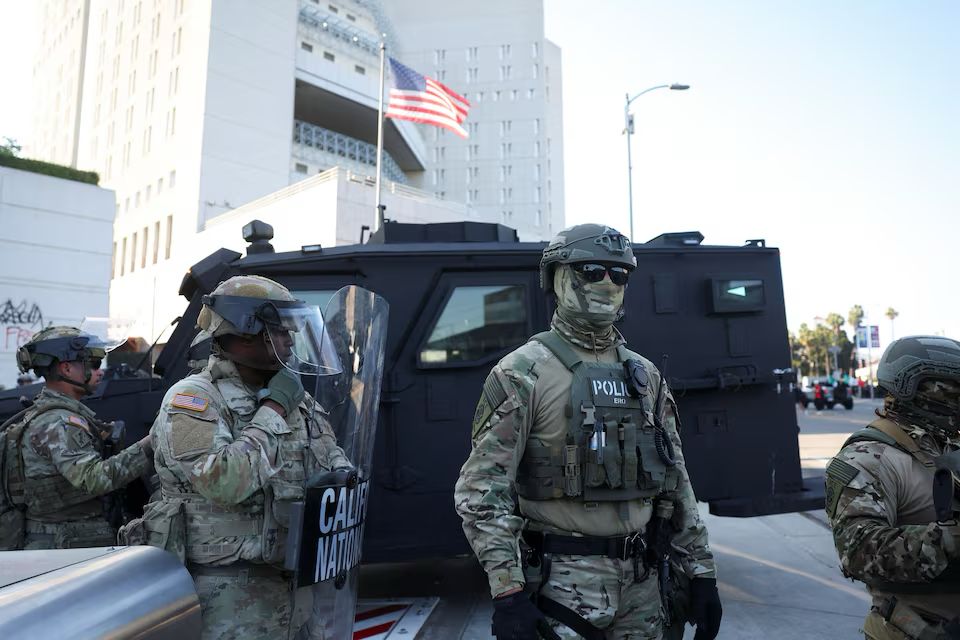A United States of America Appeal Court on Thursday granted President Donald Trump order to maintain his deployment of national guard troops in Los Angeles, temporarily pausing a lower court order that blocked the mobilization amid growing protests over intensified immigration enforcement.
The decision by the 9th U.S. Circuit Court of Appeal does not resolve the legal challenge but allows Trump to retain control over the Guard, at least for now.
The panel comprising two Trump-appointed judges and one appointed by President Joe Biden said it would hear arguments on the matter next Tuesday.
Earlier the same day, U.S. District Judge Charles Breyer ruled the deployment unlawful, ordering the National Guard to return to the control of California Governor Gavin Newsom.
The ruling cited concerns that the federal mobilisation inflamed tensions and diverted state resources needed for other priorities such as wildfire response and border security.
Breyer’s 36-page opinion emphasized that the presence of federal troops in a largely peaceful protest environment was escalatory, echoing similar concerns from Los Angeles Mayor Karen Bass.
However, Breyer’s order was placed on hold just two and a half hours later, pending further review.
Governor Newsom, while noting the temporary nature of the pause, expressed confidence that the judge’s ruling would ultimately be upheld. “On the basis of the review of the 36 pages, absolutely it will stand,” he said.
The court’s administrative stay provides more time for the appeals judges to weigh the Trump administration’s request to block Breyer’s decision while the lawsuit continues.
The dispute began after Trump dispatched National Guard troops to Los Angeles on Saturday in response to protests over immigration raids. By Monday, he ordered 700 U.S. Marines to join the Guard in support of federal operations. The Marines are expected to arrive on Friday, marking an extraordinary deployment of military forces for domestic law enforcement support.
The troops are stationed around a federal detention center in downtown Los Angeles, the epicenter of recent demonstrations. Though mostly peaceful, the protests have included isolated incidents of violence and have prompted a local curfew. The Guard has also accompanied ICE agents on operations targeting undocumented immigrants.
Judge Breyer’s ruling stated that the protests did not meet the constitutional threshold of a rebellion that would justify federal military intervention. “The Court is troubled by the implication inherent in Defendants’ argument that protest against the federal government, a core civil liberty protected by the First Amendment, can justify a finding of rebellion,” Breyer wrote.
Mayor Bass, who has called for an end to the raids, warned that fear among immigrants was disrupting local schools and businesses. “Peace begins with ICE leaving Los Angeles,” she said during a press conference.
That same event was abruptly disrupted when federal agents forcibly removed U.S. Senator Alex Padilla from the room, handcuffed him, and led him out an incident that further fueled tensions between local leaders and the Trump administration.
Meanwhile, Homeland Security Secretary Kristi Noem vowed to liberate Los Angeles, using language that critics say mirrors Trump’s combative rhetoric.
The legal and political standoff highlights the deep national divide over Trump’s aggressive immigration policies and his use of presidential powers.
The Trump administration has defended the move as necessary to restore order and fulfill campaign promises. Officials argued that Breyer’s ruling constituted “an extraordinary intrusion on the President’s constitutional authority as Commander in Chief.”
As the legal battle continues, California officials say they will continue to prepare for a potential return of Guard control to the state, prioritizing tasks such as disaster response and anti-smuggling operations.



